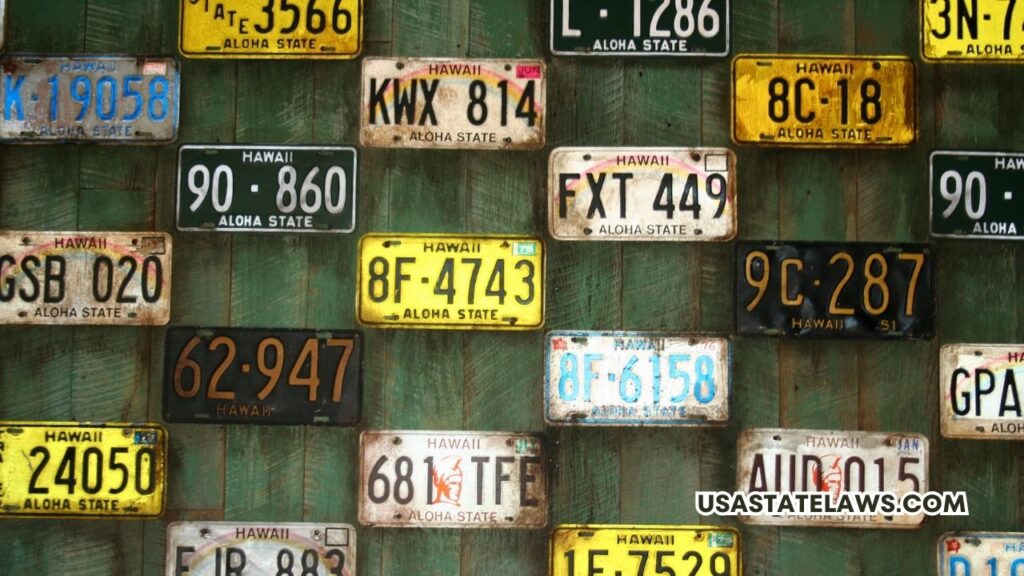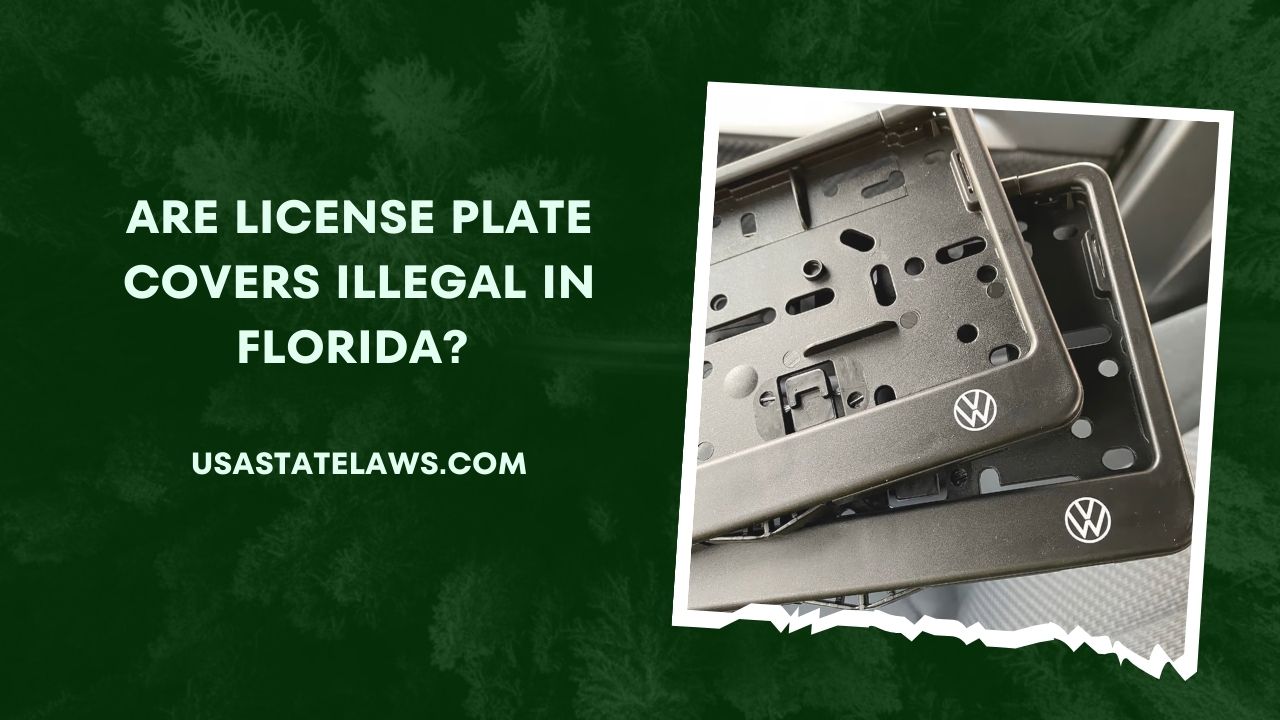Are License Plate Covers Illegal In Florida? License plate covers are generally illegal in Florida, as state law prohibits any device or covering that obscures the legibility of the license plate.
License plate covers have become a popular accessory for many vehicle owners, often seen as a protective measure or a way to add a personal touch to a vehicle.
However, the legality of using these covers varies from state to state in the U.S., and Florida is one of the states with specific laws regarding their use.
Understanding these regulations is crucial for any car owner in Florida to avoid fines and ensure compliance with the law.
This article delves into the details of whether license plate covers are illegal in Florida, the reasoning behind these laws, available alternatives, and much more.
Contents
What Are License Plate Covers?
Definition and Types:
License plate covers are plastic or acrylic accessories designed to fit over a vehicle’s license plate.
They are intended to protect the plate from damage, dirt, and weathering, but they can also serve aesthetic or practical purposes. License plate covers come in various forms, including:
- Clear Covers: These are designed to protect the plate without altering its appearance. Clear covers are generally thought to be less problematic, but they can still be illegal if they cause glare or reflection.
- Tinted Covers: These covers are tinted to reduce glare from headlights or sunlight. However, they can make it difficult for others, including law enforcement, to read the plate.
- Reflective Covers: Designed to reflect light, these covers can obscure the plate under certain conditions, such as when viewed from an angle or when a camera flash is used.
- Decorative Covers: Some covers feature designs or frames that can partially obscure the plate’s information, which is a major concern for law enforcement.
Purpose:
License plate covers serve multiple purposes, and understanding why people use them can provide insight into their popularity and the controversies they cause. Some of the most common reasons include:
- Protection: License plate covers protect the plate from road debris, dirt, and weather conditions that can cause fading or damage. [Are License Plate Covers Illegal In Florida?]
- Aesthetic Enhancement: For many car enthusiasts, a license plate cover can provide a polished look, matching the overall style of the vehicle.
- Privacy and Avoidance: Some drivers use reflective or tinted covers to obscure their plates from traffic cameras, speed cameras, and toll cameras, a practice that is often frowned upon by law enforcement and is illegal in many jurisdictions.

Are License Plate Covers Illegal In Florida?
Overview of Florida Law:
Under Florida Statute 316.605, the display of license plates must be clear and legible from a distance of 100 feet.
The law specifies that no device or cover may be used to obscure or alter the legibility or visibility of a vehicle’s license plate.
This includes any form of tinted, reflective, or even clear cover that could potentially interfere with the legibility of the plate under normal conditions or from certain angles.
Legibility Requirement:
The main concern under Florida law is the legibility of the license plate. It is crucial for the plate’s numbers, letters, state name, and registration decals to be visible at all times.
The law is in place to ensure that law enforcement, automated toll collection systems, and traffic cameras can accurately read the plates.
This is especially important in cases of accidents, traffic violations, and criminal investigations. [Are License Plate Covers Illegal In Florida?]
Specific Restrictions:
Even though some might assume that clear covers are legal, the law can still apply to them if they create glare or reflection that affects readability.
Tinted and reflective covers, which are designed to obscure plate numbers from view or cameras, are strictly prohibited in Florida.
Additionally, decorative frames that cover any part of the license plate, including state names or registration decals, are also illegal.
Enforcement and Penalties:
Violations of the law regarding license plate covers can result in fines. The fines for using an illegal license plate cover in Florida generally start at around $100 but can increase with repeat offenses.
Law enforcement officers have the authority to issue tickets on the spot if they determine that a license plate is obscured by a cover or frame.
In severe cases, continued violations can lead to more significant penalties, including court appearances. [Are License Plate Covers Illegal In Florida?]
Impact on Insurance and Driving Record:
Having a ticket for an obscured license plate on your driving record may seem like a minor offense, but it can have repercussions beyond a simple fine.
Accumulating multiple traffic violations can affect your insurance rates, as insurers may see you as a higher-risk driver.
In some cases, too many violations can lead to points on your license, potentially affecting your driving privileges. [Are License Plate Covers Illegal In Florida?]
Reasons Behind the Law
Law Enforcement Needs:
Clear visibility of license plates is essential for law enforcement to carry out their duties effectively. An obscured license plate can hinder an officer’s ability to quickly identify a vehicle during traffic stops, pursuits, or investigations.
Furthermore, technologies such as automated license plate readers (ALPRs) rely on the clarity of license plates to capture and process information accurately.
The use of tinted, reflective, or otherwise obscured covers can compromise these systems, leading to lapses in security and enforcement. [Are License Plate Covers Illegal In Florida?]
Public Safety Concerns:
Public safety is another significant concern driving the restrictions on license plate covers in Florida. Automated systems, such as red-light cameras, speed cameras, and toll booth cameras, play a vital role in maintaining traffic safety and enforcing laws.
Obstructed license plates can undermine the effectiveness of these systems, leading to unpunished traffic violations, reduced road safety, and loss of toll revenue.
Clear and legible license plates are thus critical in promoting overall traffic safety and law enforcement efficiency. [Are License Plate Covers Illegal In Florida?]
Impact on Crime Prevention:
License plates are a key tool in crime prevention and investigation. In hit-and-run accidents, for example, witnesses or cameras need to capture the plate number to track down the responsible driver.
Similarly, in cases of stolen vehicles, a clearly visible license plate can aid in recovery. License plate covers that obscure this essential information can hinder these efforts, which is why they are heavily regulated.
Alternatives to License Plate Covers
Protective Clear Covers:
While the use of tinted and reflective covers is prohibited, clear covers that do not cause glare or distort visibility may be permissible. [Are License Plate Covers Illegal In Florida?]
However, these must meet strict standards to ensure they do not affect the plate’s readability. Vehicle owners should be cautious and check local regulations and guidelines when opting for a clear cover.
Regular Maintenance:
Instead of using covers, vehicle owners can keep their license plates clean and free from debris through regular maintenance.
This includes washing the plates during regular car washes and ensuring that dirt, grime, or snow does not accumulate, which can naturally occur in certain climates or conditions.
A clean plate is a readable plate, and regular upkeep can help avoid potential issues without the need for a cover.
License Plate Frames with Minimal Obstruction:
Some vehicle owners prefer using frames around their license plates for decorative or protective purposes.
While frames themselves are not illegal, any frame that obscures even a small part of the plate’s numbers, state name, or registration decals is prohibited.
It’s important to ensure that frames are positioned in a way that does not cover any critical information on the plate. [Are License Plate Covers Illegal In Florida?]
See Also: Is Spice Illegal In Florida? Controversial Drug!
Frequently Asked Questions (FAQs)
Can I use a clear cover in Florida?
Yes, clear covers are allowed as long as they do not cause glare, reflection, or otherwise obscure the legibility of the plate. It’s essential to ensure that even clear covers meet the state’s legal standards.
What is the fine for having an illegal license plate cover?
Fines for illegal license plate covers in Florida generally start at around $100, but repeat offenses or non-compliance with removal orders can lead to higher penalties.
Are there exceptions for decorative or seasonal covers?
No, Florida law does not provide exceptions for decorative, seasonal, or temporary covers if they obstruct or alter the legibility of the license plate.
How can I protect my license plate without breaking the law?
Consider using a high-quality, non-reflective, and clear cover that does not create any glare. Additionally, regularly maintaining and cleaning your license plate can provide adequate protection.
Are license plate frames also regulated in Florida?
Yes, frames that cover any portion of the license plate, including the state name or registration decals, are considered illegal under Florida law.
Final Verdict
License plate covers, particularly tinted or reflective types, are generally illegal in Florida due to concerns over visibility and legibility.
Even clear covers can run afoul of the law if they cause glare or other visibility issues. [Are License Plate Covers Illegal In Florida?]
Vehicle owners should be mindful of these regulations and choose alternatives that comply with state laws to avoid fines, penalties, and potential impacts on insurance and driving records.
Conclusion: Are License Plate Covers Illegal In Florida?
Florida’s regulations on license plate covers are designed to promote public safety and support law enforcement efforts. [Are License Plate Covers Illegal In Florida?]
For vehicle owners, it is crucial to understand these laws to avoid unnecessary fines and ensure that their vehicles are legally compliant.
By opting for alternative protective measures or regularly maintaining license plates, drivers can avoid legal complications while still preserving the integrity of their plates.
Staying informed and adhering to these rules not only keeps you on the right side of the law but also contributes to safer roads for everyone.

Hello guys, I’m Trey Simpson from Los Angeles. After completing my J.D., I noticed a lack of clear information online about laws in different U.S. states. So, I created this blog to help. Now, I’m a lawyer and continue blogging. Thanks for visiting!

